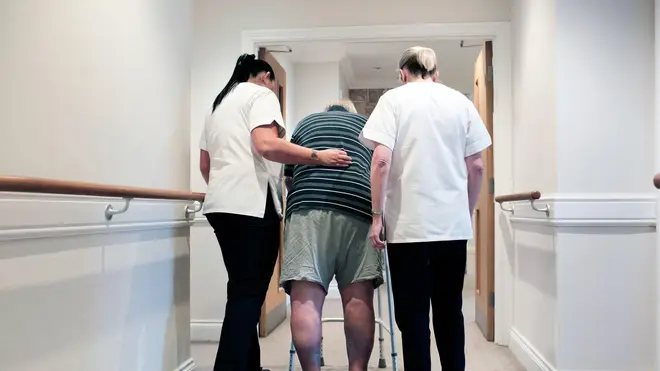
Iain Dale 7pm - 10pm
19 August 2021, 07:46

More than a quarter of care home staff in the UK are against mandatory Covid jabs, a study has found.
It comes after the government confirmed that vaccines would be compulsory for care home staff in England from November 11, according to guidance.
While 67 per cent of the 4,048 care home workers surveyed supported the move, 27 per cent disagreed and 6 per cent said they were unsure.
Care home residents are among the most vulnerable to the virus, with residents and staff offered the jab as a priority at the start of the vaccine rollout.
The research - carried out by carehome.co.uk - also found that more than half of the survey respondents (51 per cent) said Covid-19 vaccination was already mandatory for staff in the home where they work.
However, the decision to make jabs compulsory was seen as controversial by many, with some sector leaders warning of the negative impact it could have on already stretched staffing levels.
The government's best estimate is that around 40,000 care home staff risk being lost as a result of the decision, costing the industry £100 million to replace.
But it has not yet published a full impact assessment, which is expected soon.
Read more: Covid vaccines mandatory for care home staff from November 11
Read more: All England's 16 and 17-year-olds to be offered jab by 23 August - Sajid Javid

Boris Johnson doesn't agree with mandatory vaccines
A Department of Health and Social Care spokesman said: "Vaccines save lives and extensive evidence and studies show time and time again that they are incredibly safe and effective.
"While staff and residents in care homes have been prioritised and the vast majority are now vaccinated, we need to do everything we can to keep reducing the risk for the most vulnerable.
"As this survey shows, and as we know from extensive consultation with the sector, the majority of care staff are in favour of this policy and we will continue to work to drive uptake among staff to protect vulnerable people."
NHS England figures have shown that 94.4 per cent of eligible residents and 80 per cent of staff in elderly care homes are double jabbed.
That said, a quarter of care homes have not met a threshold of 80 per cent of staff and 90 per cent of residents given a first dose to provide a minimum level of protection against outbreaks, as recommended by the Scientific Advisory Group for Emergencies (Sage).
Read more: Moderna vaccine approved for people aged between 12 and 17

Care home chief on being "forgotten" by the government
Sue Learner, the editor of carehome.co.uk, said care homes must do everything they can to protect residents but forcing staff to get jabbed could result in a "huge number" leaving the sector.
Ms Learner said: "The government needs to give care homes some much-needed support over the coming months to ensure they can cope with a possible recruitment crisis if care workers do end up leaving because of this policy.
"The huge number of deaths in care homes have been catastrophic and if compulsory vaccination of care home staff gives residents better protection it should definitely be welcomed.
"But not if it plunges care homes into a staffing crisis as that is also detrimental to the health of residents and can put their lives in danger."
Read more: No evidence Covid vaccines affect ability to have children, regulator says
A London care home worker, who did not want to be identified, said she wanted to wait for more evidence on the vaccine before making a decision on whether to get jabbed.
She had been intending to retire in three years but will now have to stop working sooner.
She said: "To those who say that I am being selfish, irresponsible and am not putting residents first, you are so far off the mark.
"Putting residents first has always and still is at the heart of my caring.
"This is pure discrimination against those who refuse for their own personal reasons. I am about to lose a job I love in a care home that has respected my choice throughout."